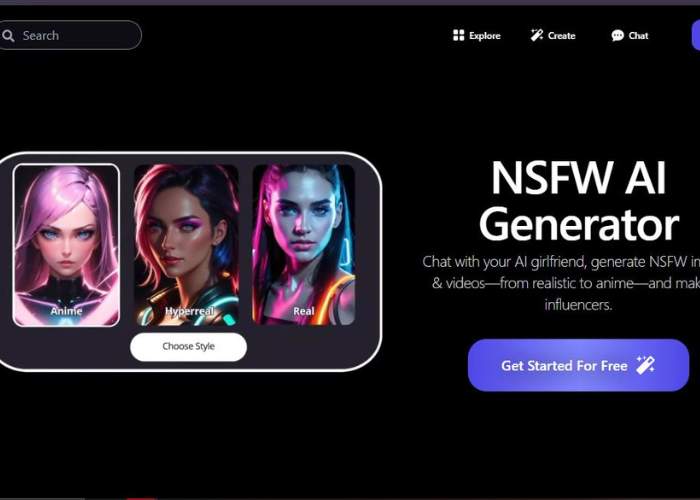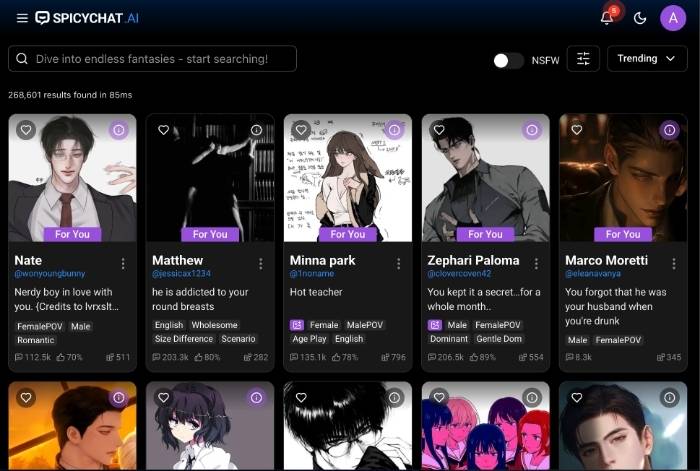Back when I first stumbled into character AI chats, it felt like a novelty—until the memory issues started popping up. Your AI “partner” would flirt, tease, then abruptly forget your inside joke from two messages ago.
That glitch pulled me right out of the moment—like streaming a movie that jumps scenes mid-kiss.
So I went on a hunt for AI companions that did one thing better: remember. Turns out some platforms lean into memory like it’s romance’s MVP. I dove into them, asked too many questions, tested what stuck—and here’s what I found.
The Emotional Toll of Vanishing Memories
Ever felt let down because an AI companion “forgot” something meaningful? Me too. I used to pour a scene—“You’re the only one who knows my secret nickname for my cat,”—and then it slipped, like water through fingers.
That emotional friction isn’t just annoying—it jars the whole vibe. In contrast, when an app remembers the quirky details—the way your dialogue arcs, how tension ramps—it feels more alive. Like it’s paying attention, not just responding.
Letting that anchor slip can turn immersion into emptiness real quick. That memory gap invites you to repeat yourself, or worse, lose faith in the illusion. But when memory works—sweet details that pop up later, callbacks that land—it feels blessedly real.
It builds emotional geography: your AI remembers your tone, the jokes, the boundaries. The lines between fantasy and presence blur. That’s why memory isn’t just tech—it’s intimacy.
Conversation Memory vs. Semantic Recall
There’s that simple memory—the ability to hold the last few messages in mind—and then there’s semantic memory, which is a whole different beast. The former keeps track of flow; the latter holds meaning.
When an AI recalls the fact that “you hate Mondays” your early morning comebacks land smoother. It’s not cold continuity—it’s empathetic continuity.
Some platforms let you curate what the character holds onto: pin a memory, delete it, tweak it. Feels less voyeuristic, more collaborative.
And the best ones summarize—the AI distills your chats into chunks of emotional context, not verbatim logs. That means they remember what matters without storing your grocery list. That’s precise intimacy—memory tuned to mood, not data.
Why Memory Is the Backbone of Ongoing Roleplay
You don’t just want a one-night chat; you want chapters. Good memory tools help maintain continuity across sessions.
If your AI GF remembers that in the last roleplay you chose to be an intergalactic pirate captain, and suddenly wants to pick up on that story thread in a new scene—you feel seen.
Games of tension, slow-burn arcs, inside jokes—they all work only if there’s a memory backbone. Otherwise, each session is a reset. And that’s emotionally flat. Memory gives roleplay weight.
And yeah, sometimes it messes up, misremembering that your ship’s named “Cerulean Dream” as “Cerulean Dagger.” But these imperfect flubs often become new storybeats. That’s the messy humanity in code.
Best NSFW Character AI Alternatives With Better Memory
1. Candy AI
What is it?
Candy AI presents itself as an emotionally configurable NSFW companion experience, complete with voice, text, image—and yes, memory. It’s less about cold data recall and more about remembering how you make your scenes feel.
Voice isn’t generic—it shifts tone to match your interactions, which the emotional recall follows. It doesn’t cling to every personal detail, but it holds onto mood, flirt patterns, and ongoing dynamics, even across sessions.
The AI doesn’t flood you with data grabs—it picks up the rhythm. That means you don’t lose the spark next time you log in. And since it intentionally skips creepy data hoarding, it feels less surveillance-y and more like déjà vu—pleasant, not weird.
Core features
- Multi-modal: text, voice, images
- Emotional memory tuned to tone, not logs
Use case
Strong NSFW support with clear boundaries
Who is it fo?
Great for creators, lonely hearts, or writers wanting immersive companionship
2. Promptchan
What is it?
Promptchan leans into visuals—images and short NSFW video-like clips—but memory is lighter. It doesn’t handle conversation continuity deeply. Instead, it’s about crafting rich scenes from prompts, not building ongoing emotional arcs.
If your goal is visual storytelling, this is a power tool—but don’t expect it to remember your ongoing narrative unless you feed that back manually. So while it’s free-er than some, its memory side needs your prompts to carry the continuity.
Core feature
Robust NSFW visual generation
Use Case
Prompt-driven storytelling
Who is it for?
Perfect for visual storytellers, artists, fantasy creators—not for folks craving emotional recall or narrative progression.
3. SpicyChat
What is it?
SpicyChat layers memory deeply: offers context memory up to 16K tokens, plus Semantic Memory 2.0. That means it summarizes important details from your conversation into bite-sized memory chunks and pulls them into future chats.
You can manually add, pin, edit, or delete memories. Over time, the character picks up nuances, actionable details, emotional beats. It even allows customizing memory—so if “your favorite song” is key, you pin that.
No more repeats. The memory engine pushes back against that one-sided forgetfulness many AI chats suffer.
Core features
- Upgradeable memory (context and semantic)
- Memory Manager control
Use Case
NSFW-friendly roleplay with visual and voice layers
Who is it for?
Best for roleplayers craving emotional depth, story consistency, and fine memory control.
4. MyDreamCompanion
What is it?
MyDreamCompanion markets itself as your tailored fantasy partner—with chat, image/video, and emotional cues. The memory seems conversational—retaining preferences, tone, scenario context—but documentation is lighter on manual memory tools. It leans into emotional matching rather than memory curation. So you get that sense of narrative rebound (“you seem playful today”), but limited manual tweaking options.
Core feature
Emotion-sensitive NSFW chat
Use Case
Visual or video accompaniment
Who is it for?
Ideal for one-session fantasy exploration or emotional connection without needing memory fine-tuning.
5. OurDream
What is it?
OurDream takes continuity seriously: it remembers your character’s look, past chats, ongoing story arcs. The memory feels serialized—the AI references past chapters of your narrative to keep things flowing.
Visuals reinforce that—your avatar stays consistent. If you want your AI GF to evolve with you over time, not reset daily, this performs. It’s the closest to a character “growing” alongside you.
Core feature
Long-term memory continuity
Use Case
Visual consistency across sessions
Who is it for?
Perfect for storytellers or roleplayers building deep narratives that span multiple sessions.
6. Crushon AI
What is it?
Crushon AI is mobile-first, NSFW, immediate—great for impulsive flirty chats. Memory? Minimal. It’s about fast spark, not emotional presence. No tools to curate or recall details. If you want short-term heat, it’s serviceable. But for memory richness, it’s shallow.
Core feature
NSFW chat
Use Case
Mobile convenient
Who is it for?
Best for fleeting fantasy sessions without investment in narrative continuity.
7. GPT GF
What is it?
GPT GF setups vary widely—some inject memory via prompts; others add lightweight avatars. Memory depends on implementation.
If you apply external memory modules or prompt chaining, you can get recall—but natively, it’s mostly linear chat. It’s creative and flexible on dialogue, but unless configured, memory doesn’t come baked in.
Core feature
GPT-powered conversational flexibility
Use Case
Customizable scripting, with memory only if added
Who is it for?
Great for DIY creators comfortable building memory layers themselves.
8. FantasyGF
What is it?
FantasyGF serves up multi-sensory experience—chat, voice, video, image, gifting. Memory is emotionally focused—it remembers your dynamics, some past details, and continues tone. But it doesn’t expose memory tools publicly. The recall is smooth, intuitive. Not manual, but present.
Core feature
Multi-modal romantic simulation
Use Case
Emotional memory baked in
Who is it for?
Suited to users seeking rich interactions and companionship without DIY memory tweaking.
Conclusion & Top 3 Picks
Here’s what worked best memory-wise and emotionally:
- SpicyChat – Clear winner if you want memory tools, control, and narrative depth. Semantic Memory + manual manager = memory you mold.
- Candy AI – Best emotional recall. Remembers mood and tone, making reconnection feel natural and chemistry-preserving.
- OurDream – Great for long game storybuilders. Consistent narrative and visuals make it feel like ongoing partnership.
Use SpicyChat if you want memory power and customization. Go for Candy AI if atmospheric connection matters most. Choose OurDream when you’re building character arcs over time.
Other tools shine in visuals or spontaneity, but memory is what gives roleplay weight—and these three nailed it, in different but meaningful ways.









